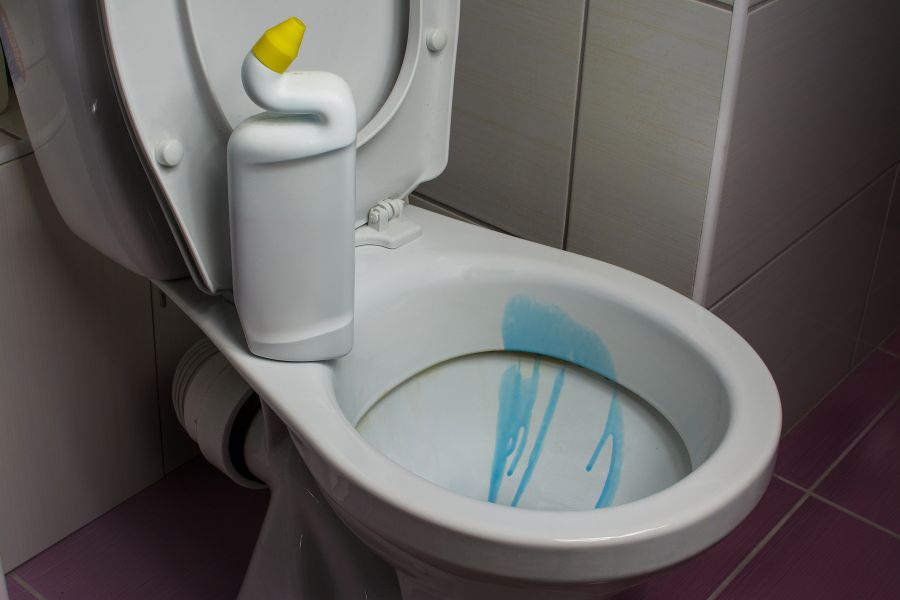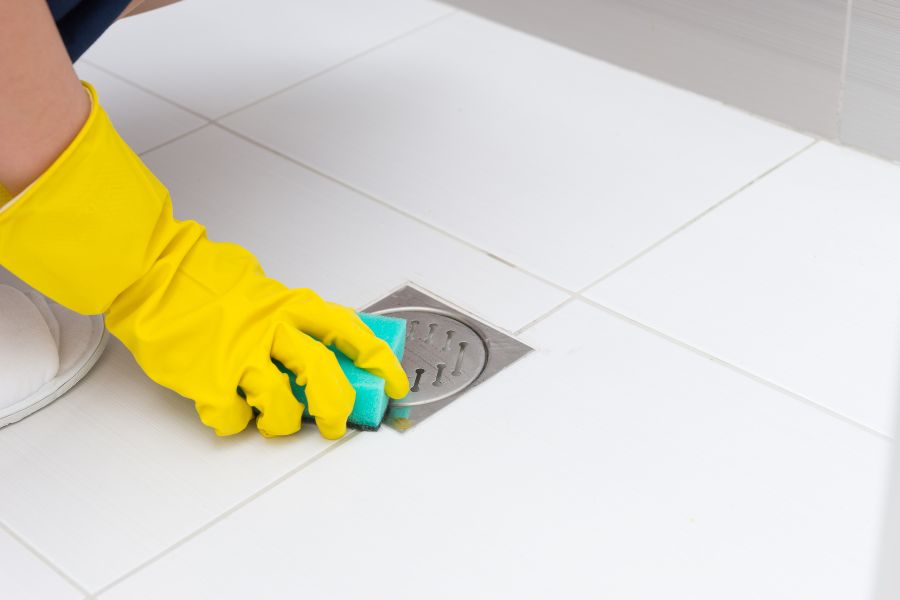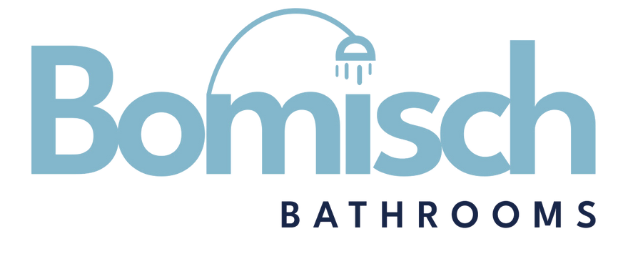When you have a stained shower stall, dirty tile walls, or mold around caulking, you probably wonder if you can use toilet bowl cleaner in a shower?
[cboxarea id=”cbox-Y8oqRPm2fZnZQQtJ”]
No, you should never use toilet bowl cleaner to clean in a shower as they could corrode surfaces or leave permanent stains behind.
These toilet bowl cleaners are handy, and while it’s easy to assume what will work on one surface may work on another – that couldn’t be further from the truth. The corrosive nature of toilet bowl cleaners is only one reason to steer clear of using them in showers.
We’re going to break down the facts in our guide, and tell you how to safely clean any shower in your home using household ingredients and suitable cleaning agents.

Chemicals in Toilet Bowl Cleaners
To understand why you should never use toilet bowl cleaners in a shower, it’s a good idea to know what’s in them.
Some toilet bowl cleaners are more natural than others, although none are designed to clean shower surfaces like glass, tile, or fiberglass.
Many toilet cleaners use a coloring agent to improve visibility against a white porcelain toilet bowls, which could leave stains behind in older tubs that have been converted to showers.
Two ingredients in toilet bowl cleaners are more harmful than others, and the biggest reason to be cautious is that many toilet bowl cleaners can use a measure of bleach or hydrochloric acid.
Bleach
Bleach is a common ingredient found in many toilet bowl cleaners, regardless of the color or type.
It’s a fantastic disinfectant used to cleanse other surfaces and eliminate bacteria. In fact, the CDC has a number of tips on how to safely use bleach to clean items in and around your home.
Can you use toilet cleaner with bleach in it to clean a shower?
No, as it’s not just regular bleach in the toilet cleaner. The bleach could have a coloring agent or another substance that may harm your shower.
While household bleach is an excellent cleaning solution, mixing it with other substances is incredibly dangerous.
NEVER mix bleach with any other cleaning agent or you could risk toxic fumes – only dilute it with water.
Hydrochloric Acid
If you’ve never looked at the back of a bottle of toilet bowl cleaner, you might be surprised that some contain an amount of hydrochloric acid.
While hydrochloric acid is ideal for removing stubborn stains that bleach-based mixtures can’t get, it’s also highly corrosive.
Solutions like Zep Acidic toilet bowl cleaner can make your toilet glow, but also put out fumes and will burn your skin even if it smells like Pine trees.
These toilet bowl cleaners are “safe” to use in toilets with coatings designed to deal with hydrochloric acid.
If you squirt hydrochloric acid around a shower wall or on a fiberglass surround, you could quickly have a problem on your hands.
This type of toilet cleaner could pit the surface of the tub if it’s porcelain and completely ruin plastic tub liners.
Can you use hydrochloric acid cleaners in a shower?
We don’t recommend it, even if you see videos online telling you otherwise. Any type of acid can irritate your skin, eyes, and airways. Acid will also degrade certain surfaces instead of making them spotless.
Is It Safe To Use Toilet Bowl Cleaner in a Shower?
No, don’t use toilet bowl cleaners in showers. It’s not something we recommend, and there’s a reason companies make all-purpose shower cleaners.
You wouldn’t use a tile scrubber or foaming bubbles in your toilet, so don’t use toilet cleaner in a shower.
Alternative Products To Use for Cleaning the Shower
Whether you’ve never purchased shower cleaning supplies or don’t know what works, you’ll be impressed by how quickly you can tidy up a grimy shower.
You can forget about toilet cleaner and pick up one of these options, which covers any type of shower, whether it’s stone, tile, or half porcelain and fiberglass.
Shower Cleaners
An all-purpose shower cleaner is your best friend when shower walls or the floor gets dirty. They work on a wide variety of surfaces, including stone and fiberglass, without damaging anything in the area.
If you’re sensitive to how cleaning products smell, there are even natural cleaners available.
Bleach
It may be a terrible idea to use bleach-based toilet bowl cleaner, or any toilet bowl cleaner, in a shower. Bleach itself is a perfect option, however, as it can kill germs and help keep mold and mildew at bay.
Vinegar & Baking Soda
Bleach is effective against germs but doesn’t provide the scrubbing power you’ll get from a mixture of vinegar and baking soda.
These two household staples are simple to use and are great cleaning supplies to have in bathrooms and kitchens.
Tile Scrubbers
When you have a shower with a tiled wall or floors, grout and the tile itself needs to be cleaned routinely.
The best way to accomplish this is with a telescoping tile scrubber like this one from Yocada Tub.
These tile stain removers can clean tile and grout lines without breaking your back or bank account.

How To Clean a Shower Without Toilet Bowl Cleaner
Now that you know that toilet bowl cleaners are not shower-friendly, it’s time to turn towards more reasonable alternatives.
Tile scrubbers are self-explanatory and a tool you can use with any of the cleaning solutions we’re going to cover.
If you plan on using bleach ,soda, vinegar, or a chemical cleaner designed for showers, here are some things to keep in mind.
Baking Soda and Vinegar
One of our favorite ways to clean fixtures, grout, and grimy showers is with this homemade shower cleaner made from soda, vinegar, and water.
The right combination can clear a clogged drain in a sink or shower, but you’ll need a different kind of mixture to scrub stained areas in a shower.
Any type of soda will do, and while most recipes call for white vinegar, apple cider vinegar is a fine substitute. This process works best for spot cleaning or smaller shower surfaces, including grout lines, corners, and caulk.
Take a small container large enough to hold the amount of cleaning solution you’ll mix. Place anywhere from half a cup to a tablespoon of baking soda into the container, depending on your needs.
Use small amounts of water to form a paste. You’ll want a good consistency for any vertical surfaces but can thicken things up with more baking soda if it gets too thin.
Apply the paste to any areas you want to clean using an old toothbrush. You can use this gritty mixture as-is, but adding a sprinkle of white vinegar will kick things up a notch.
You can spot clean with the brush, although we advise using a sponge or rag for large areas and bathroom surfaces. When satisfied, rinse the shower surfaces with warm or hot water.
This process is safe to use on fiberglass, tile, stone, and grout or even chrome plating on showerheads or other accessories in your shower.
Bleach
Bleach doesn’t provide the same grit you’ll get from baking soda, and you can’t combine it with anything other than water. It’s the best choice for showers that have an issue with mold or mildew, however.
For this process, we recommend using a spray bottle and a sponge or scrub brush appropriate for the surface of your shower.
Mix a bleach solution using a 1:1 ratio of bleach and tap water, then spray down the dirty surfaces in the shower.
Let the mixture sit for a few minutes before scrubbing it. With mold or mildew, give the mix up to 20 minutes to work before cleaning and rinsing the shower surfaces and areas.
You can repeat this process as needed, but if it isn’t tough enough and baking soda won’t cut it, you’ll want to turn to a more robust cleaner.
Chemical Cleaners
Most major cleaning brands have an all-purpose shower cleaner. When you need a cleaner good at removing stains, household products can’t, there is no shortage of options to choose from.
Before choosing a chemical cleaner, think about the dirty surfaces, the type of grime you need to remove, and if fumes from cleaning solutions affect you.
For mold and mildew, there are specialty products like RMR-86, but foamy sprays like CLR Routine Clean are better suited for widespread shower cleaning and great against rust stains. You’ll need a sponge or scrubber with both products, and CLR is safe for almost every surface, including glass and porcelain.
There are even kits designed to remove soap scum from dishes and grout like ForceField ScumBlaster.
You can tackle the grime with a magic sponge and some water for light stains and times when you don’t feel like pulling out the cleaning supplies.
The Bottom Line
You should NEVER use toilet bowl cleaner or any toilet cleaners in a shower regardless of what tips you see online, considering there are home-based solutions that don’t require any chemicals.
It’s as simple as that, so if you don’t want to damage your shower, use one of the methods in our guide to tidy things up.
If you have a severe mold or mildew issue in a shower or around caulking, the tips in this guide can also help you clear up those problems.
FAQ
Can You Use Toilet Cleaner in a Bathtub?
No, and for the same reasons you shouldn’t try toilet bowl cleaners. Even if your tub is porcelain, not fiberglass, only use all-purpose products or those designed for bathtubs not toilet bowls.
How Often Does a Shower Need Cleaned?
Once a week is ideal if you want to make sure mold and bacteria don’t become an issue.
Can You Use Car Wax on Tiled Shower Walls?
Yes, a paste-based wax can make shower tiles shine on the walls and help prevent mildew. Do not get any wax on the floors, and only use it after the tiles have been thoroughly cleaned.
